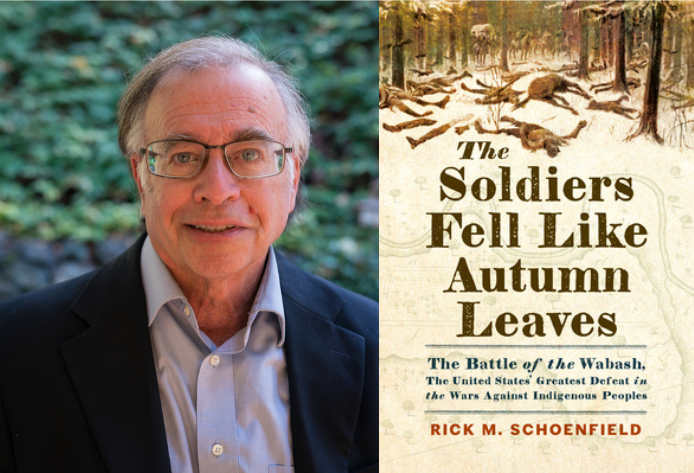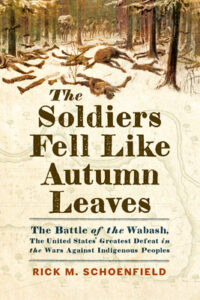
- This event has passed.
Join us at Yorktown Mall for a signing of Rick M. Schoenfield’s book “The Soldiers Fell Like Autumn Leaves” June 1st | 2pm CST
June 1 @ 2:00 pm

June 1st | 2pm CST
The Soldiers Fell Like Autumn Leaves | Rick M. Schoenfield
We kindly request that if you would like your book signed, it must be purchased at Barbara’s Bookstore. To ensure a smooth and efficient signing process, please present your receipt as proof of purchase.
ABOUT THE BOOK
 Along the Wabash River near present-day Fort Recovery, Ohio, on November 4, 1791, the Maumee Confederation of Indigenous tribes destroyed a superior American army led by Revolutionary War veteran General Arthur St. Clair. The victory was so complete, that the Shawnee recalled that the “the ground was covered with the dead and the dying.” Also known as “St. Clair’s Defeat” and “The Battle With No Name”—since the US forces did not know where they were—the Battle of the Wabashwas the United States military’s worst disaster in the history of the Indian wars. This, despite the army having artillery and outnumbering the confederation warriors by almost two to one. It was both the new Republic’s first war and its first undeclared war. Ordered on the offensive by President George Washington in an attempt to exert control of the frontier, the defeat triggered the first Congressional investigation and the first assertion of executive privilege. Often overlooked is thatno other Native American battle in three centuries, from colonial times to Geronimo, affected somany lives. The Maumee Confederation’s victory largely stymied American expansion into the rest of the Northwest Territory, and ultimately into the Great Plains for almost four years. For the Native Peoples this was a respite from the incessant deforestation that accompanied western settlements. While Ohio and the rest of the Old Northwest ultimately succumbed to US control, President James Madison would later warn his fellow Americans that the unchecked destruction of the natural environment was as much of a threat to national security as any enemy along its borders.
Along the Wabash River near present-day Fort Recovery, Ohio, on November 4, 1791, the Maumee Confederation of Indigenous tribes destroyed a superior American army led by Revolutionary War veteran General Arthur St. Clair. The victory was so complete, that the Shawnee recalled that the “the ground was covered with the dead and the dying.” Also known as “St. Clair’s Defeat” and “The Battle With No Name”—since the US forces did not know where they were—the Battle of the Wabashwas the United States military’s worst disaster in the history of the Indian wars. This, despite the army having artillery and outnumbering the confederation warriors by almost two to one. It was both the new Republic’s first war and its first undeclared war. Ordered on the offensive by President George Washington in an attempt to exert control of the frontier, the defeat triggered the first Congressional investigation and the first assertion of executive privilege. Often overlooked is thatno other Native American battle in three centuries, from colonial times to Geronimo, affected somany lives. The Maumee Confederation’s victory largely stymied American expansion into the rest of the Northwest Territory, and ultimately into the Great Plains for almost four years. For the Native Peoples this was a respite from the incessant deforestation that accompanied western settlements. While Ohio and the rest of the Old Northwest ultimately succumbed to US control, President James Madison would later warn his fellow Americans that the unchecked destruction of the natural environment was as much of a threat to national security as any enemy along its borders.
The Soldiers Fell Like Autumn Leaves: The Battle of the Wabash, the United States’ Greatest Defeat in the Wars Against Indigenous Peoples by Rick M. Schoenfield places this important war into its cultural, racial, economic, and political context. For the first time, the ecological impact is explored, for at stake in the clash between Woodland Native Americans and white, agrarian settlement, was the fate of a vast forest eco-system. The issue echoes today in the debate over climate change, deforestation, and indigenous control of forest habitats. Based on primary sources, some of which are consulted here for the first time, including a newly discovered muster roll and the recent archaeological study of the battlefield, the author provides the most accurate description of the battle while capturing the drama of what occurred. He also critically examines the information gathering,planning, and tacticsof both the Maumee Confederation and the United States, from the conception of the campaign through the battlefield decisions. By skillfully weaving together the disparate but related parts of the larger history of this battle,The Soldiers Fell Like Autumn Leaves allows the reader to better understand the motivations and long-term consequences of the war against Native peoples in the Americas.
ABOUT THE AUTHOR

Rick M. Schoenfield earned a BA and a JD from Northwestern University. He has been a trial and appellate lawyer for over 40 years. A highlight of Rick’s legal career was taking a case pro bono, after it was lost in the federal court of appeals, getting the case to the Supreme Court and winning unanimously. Rick is the co-author of The McGraw-Hill 36-Hour Negotiating Course and Legal Negotiations: Getting Maximum Results. He also taught negotiations at Chicago-Kent College of Law. Native American history, early American history and military history have been of particular interest to Rick throughout his life. He found that many of the skills he acquired in his legal career were equally useful in researching and writing The Soldiers Fell Like Autumn Leaves.
